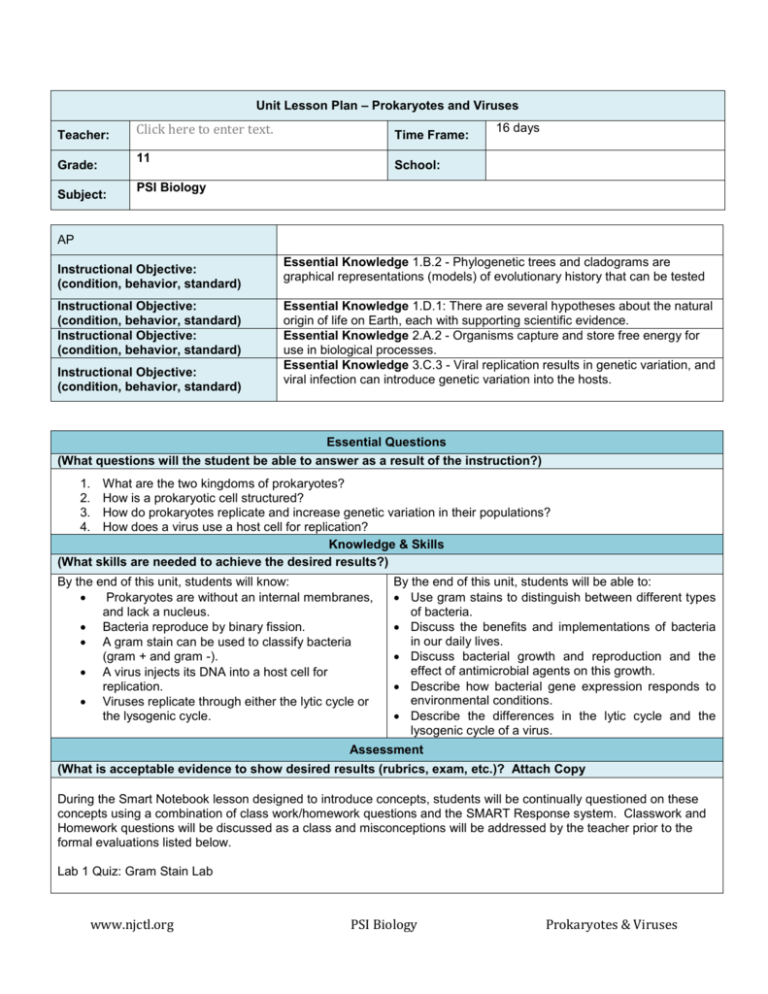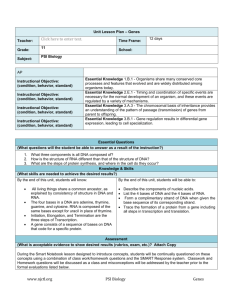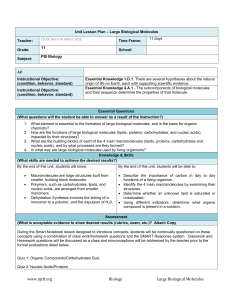Unit Lesson Plan * Atomic Structure
advertisement

Unit Lesson Plan – Prokaryotes and Viruses Teacher: Grade: Subject: Click here to enter text. Time Frame: 11 16 days School: PSI Biology AP Instructional Objective: (condition, behavior, standard) Instructional Objective: (condition, behavior, standard) Instructional Objective: (condition, behavior, standard) Instructional Objective: (condition, behavior, standard) Essential Knowledge 1.B.2 - Phylogenetic trees and cladograms are graphical representations (models) of evolutionary history that can be tested Essential Knowledge 1.D.1: There are several hypotheses about the natural origin of life on Earth, each with supporting scientific evidence. Essential Knowledge 2.A.2 - Organisms capture and store free energy for use in biological processes. Essential Knowledge 3.C.3 - Viral replication results in genetic variation, and viral infection can introduce genetic variation into the hosts. Essential Questions (What questions will the student be able to answer as a result of the instruction?) 1. 2. 3. 4. What are the two kingdoms of prokaryotes? How is a prokaryotic cell structured? How do prokaryotes replicate and increase genetic variation in their populations? How does a virus use a host cell for replication? Knowledge & Skills (What skills are needed to achieve the desired results?) By the end of this unit, students will know: Prokaryotes are without an internal membranes, and lack a nucleus. Bacteria reproduce by binary fission. A gram stain can be used to classify bacteria (gram + and gram -). A virus injects its DNA into a host cell for replication. Viruses replicate through either the lytic cycle or the lysogenic cycle. By the end of this unit, students will be able to: Use gram stains to distinguish between different types of bacteria. Discuss the benefits and implementations of bacteria in our daily lives. Discuss bacterial growth and reproduction and the effect of antimicrobial agents on this growth. Describe how bacterial gene expression responds to environmental conditions. Describe the differences in the lytic cycle and the lysogenic cycle of a virus. Assessment (What is acceptable evidence to show desired results (rubrics, exam, etc.)? Attach Copy During the Smart Notebook lesson designed to introduce concepts, students will be continually questioned on these concepts using a combination of class work/homework questions and the SMART Response system. Classwork and Homework questions will be discussed as a class and misconceptions will be addressed by the teacher prior to the formal evaluations listed below. Lab 1 Quiz: Gram Stain Lab www.njctl.org PSI Biology Prokaryotes & Viruses Quiz 1: Structure & Function Lab 2 Quiz: Bacteria Lab Quiz 2: Reproduction and Gene Expression Quiz 3: Genetic Variation and Viruses Unit Test (What is the sequence of activities, learning experiences, etc, that will lead to desired results (the plan)? Topic Classwork Homework 1 Types of Prokaryotes SMART Notebook Slides 618; Questions #1-5 #6-9 2 Structure & Function (External) SMART Notebook Slides 19-29; Naming Bacteria Activity Complete Activity (if not done in class) 3 Gram Stain Lab Gram Stain Lab Analysis 4 Structure & Function (Internal) Lab Quiz: Gram Stain SMART Notebook Slides 30-39; Questions #10-17 #18-23 5 DNA Review/Reproduction Quiz 1: Structure & Function SMART Notebook Slides 40-54; Questions #24-27 #38-39 6 Bacterial Growth Bacterial Growth SMART Notebook Slides 5-40 7 Bacterial Growth 8 Bacterial Growth 9 Gene Expression - Review 10 Gene Expression – Symbiosis Day www.njctl.org Bacterial Growth SMART Notebook Slides 41-50 Bacterial Growth Lab Day 1 Bacterial Growth SMART Notebook Slides 52-64 Bacterial Growth Lab Day 2 Lab Quiz: Bacterial Growth SMART Notebook Slides 55-64 Analysis SMART Notebook Slides 65-77; Questions #28-37 #40-47 PSI Biology Prokaryotes & Viruses 11 Genetic Variation Quiz 2: Gene Expression SMART Notebook Slides 78-89; Questions 48-50 #57-58 12 Genetic Variation – Viruses SMART Notebook Slides 90-112; Questions 51-56 #59-63 13 Biotech: Recombinant DNA Technology SMART Notebook Slides 113-138; Questions 64-66 #67-69 14 Review Quiz 3: Genetic Variation MC/FR MC/FR 15 Review Vocabulary Concept Mapping MC/FR MC/FR Pre Assessment Euk: Vocabulary Concept Mapping *Lessons are based on 40minute periods and may need to be adjusted to fit the schedule of your school. 16 www.njctl.org Test Unit Test PSI Biology Prokaryotes & Viruses








